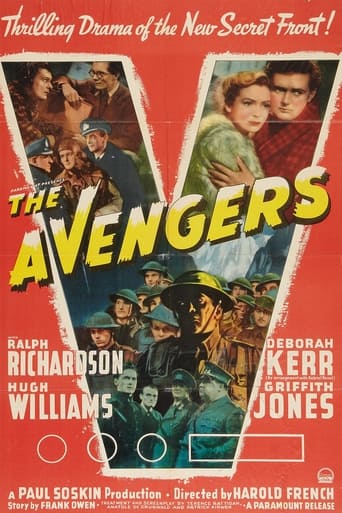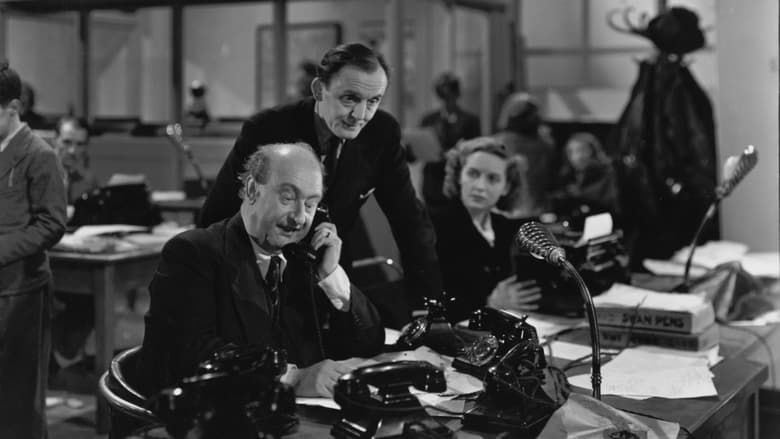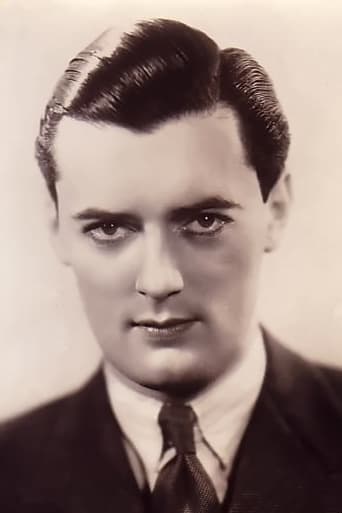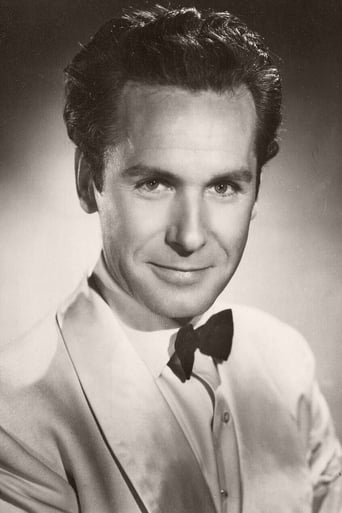The Day Will Dawn (1942)
Sports journalist Colin Metcalfe is picked for the job of foreign correspondent in Norway when Hitler invades Poland. On the way to Langedal his boat is attacked by a German U-Boat, however when he tells the navy about it they do not believe him and, to make matters worse, he is removed from his job. When German forces invade Norway, Metcalfe returns determined to uncover what is going on and stop the Germans in their tracks.
Watch Trailer
Cast


Reviews
Wonderful Movie
Memorable, crazy movie
Good concept, poorly executed.
If the ambition is to provide two hours of instantly forgettable, popcorn-munching escapism, it succeeds.
As FDR said, "If anybody is unsure as to why this war is being fought, let them look to Norway". This British film came a year before Warner Brothers' "Edge of Darkness" ended with that paraphrased quote. That lavish drama with Errol Flynn took place in a coastal fishing village and covered pretty much the same topic as this, how the locals all got together and vowed to drive the Nazis out, no matter what the consequences or loss of life might be. The same thing happens here, except that it all starts with the arrival of the German U-Boats and shows how the British got involved with the resistance, assuring them with a "wait and see" attitude that the timing would ultimately wound the Nazis more than an all out attack before their defenses were down.Ralph Richardson is the British spy in the camp, assuring Norweigans that help is imminent. He falls for the lovely Deborah Kerr, the feisty daughter of a fisherman being held by the Nazis for making anti-German statements. She is forced to marry a "Quisling" (traitor) to save her father and as a result of her marriage becomes an outcast even though she is secretly working with several members of the resistance who know the truth. The other townspeople do everything in their power to make the Nazis lives miserable, humorously going out of their way with little annoyances. When a night raid leaves dozens of Germans dead, eight Norwegian men (along with Richardson and Kerr) are arrested and sentenced to be shot, but in the nick of time, a crowd pleasing (if improbable) finale leads to a hopeful ending where the usual propaganda machine narrative warns against the Nazis and also warns the Axis (for those of them who would actually see this film) that their days were numbered and that the day would dawn when freedom will ring again for German occupied countries.Films like this were a dime a dozen during World War II and most are at least enjoyable if not predictable in their narrative. The Nazis are presented fairly, only a few being genuinely evil, the others doing their duty as they've been ordered, a reminder that many of them too were either manipulated or forced by evil powers greater than themselves to follow a leader they feared too much to rebel against.
A brisk story of Hugh Williams as a British reporter who plays the horses, knocks about Europe as the war begins, and trades quips and rounds of beer with such colleagues as Ralph Richardson.He's exiled to Norway for his light and careless approach to his duties, but Norway turns into a hot spot when the Germans take it over and build a secret U-boat base. With the help of locals, who include Deborah Kerr, Williams manages to escape but the government sends him back to the village to set up a signal to the bombers that will try to demolish the submarine base.The base is, in fact, destroyed by the raid but Williams and many others are taken into custody and sentenced to be executed. This leads to a few harrowing moments in the jail, while Williams comforts a terrified Kerr. Then the cavalry arrives. Some day the dawn will come again.It's a rather mediocre war-time flag waver. It's not bad; it's just that it's not very polished. The plot, looked at as a whole, resembles the crab nebula of Orion. Britain to Poland to Britain to Norway to Britain to Norway to Britain.Williams is all right as the wisecracking reporter but Deborah Kerr, a truly fine actress, is miscast and undone by her make up. Kerr has a fragile beauty and a tremulous voice. She's always a little frightened in her later movies. (I like that in a woman.) But here she's barely recognizable as an earthy, stalwart Norwegian peasant. I mean it literally when I say "barely recognizable." Her fair hair is bound in curls that twist around each other like a loaf of challah. Her eyelids seem to have been darkened so much that they droop like an alcoholic's, and her lipstick is a glossy obsidian. She was only twenty-one but appears older and, in some scenes, a little debauched. She has one or two poignant moments, though. While exchanging small talk with Williams, awaiting execution in a darkened cell, she suddenly shudders, buries her face against his shoulder, and cries, "I'm AFRAID." So are we all, darling.The sequence in which Williams is parachuted into Norway is short but done with vigor.
British wartime propaganda film in which Hugh Williams plays a British foreign correspondent investigating German U-boat activities in Norway. The disparate elements of the film however, in terms of location, narrative and character, do not seem to have been successfully combined into a cohesive whole. Apart from the Hugh Williams character there is a lack of focus, and the film comes across as episodic and disjointed. Ralph Richardson, for example, is for the most part wasted in a role which despite popping up briefly all over the place, seems to have very little relevance to either plot or theme. Finlay Currie, always worth watching, does well by his part and has the most convincing accent of the piece, but Deborah Kerr sounds as Norwegian as praties. Francis L Sullivan trots out another of his well worn villains.
Horse race tipster and journalist Metcalfe is picked for the job of foreign correspondent in Norway when Hitler invades Poland. On the way to Norway his boat is attacked by a German U-Boat, however when he tells the navy about it they disbelief him and, to make matters worse, he is removed from his job. When German forces invade Norway, Metcalfe returns determined to uncover what is going on and stop the Germans in their tracks.1940's British cinema is understandably packed with wartime propaganda pieces. This film doesn't stand out from the pack but it is still worth a watch. The basic plot is interesting and provides tense drama towards the end, even if it gets all confused at times in the middle and some of it didn't quite hang together for me. The action is a little stilted at times and the film never misses a chance to show how very selfish and foolish the German officers are. This is a little heavy handed but what did you expect from a propaganda film? However it is badly done at times and seems heavy handed.The cast are mainly good. Williams is typical of the stiff upper lip English heroes of this type of film. Again it seems a little stiff but it's the usual sort of English gentleman that we wanted to see at the time especially when compared to the slimly cowardly Germans shown here. The support cast are OK despite the very, very iffy Norwegian accents, but this doesn't matter too much.Overall this film is typical British wartime propaganda. The Brits save the day, the Germans are cowardly, sacrifice is made but the greater good is served. As a Brit this is a solid bit of entertainment for a rainy Saturday afternoon, but probably not much more capable than that.








